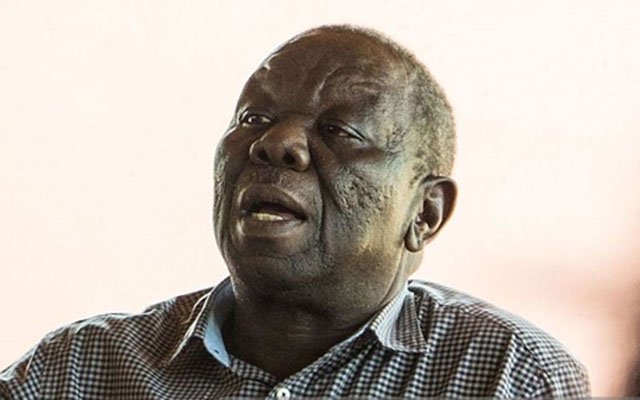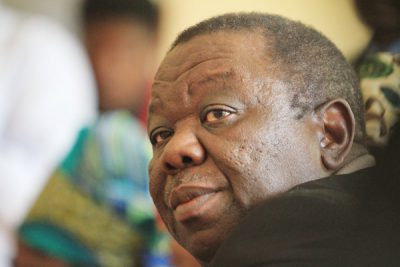INGRAINED in human nature is the base instinct — that subconscious urge, behaviour, or intuition directed by primeval, animalistic, self-serving, and/or ignoble motivations.
BY CONWAY TUTANI
That’s why we are seeing some such psychologically depraved characters among us taking sadistic delight in main opposition MDC-T leader Morgan Tsvangirai’s (pictured) illness which resulted in him being airlifted to South Africa around 2am last week for emergency cancer treatment.
Many of these base instinct-stricken elements will not gain any advantage of any sort from Tsvangira’s condition or his leaving the political centre stage, but still can’t resist being horrible for the sake of being horrible because the horrid instinct in human nature delights in the misfortune of others.
But this does not detract from the fact that Tsvangirai’s state of health is now an unavoidable issue. Were he in a fit state of health, there would be nothing to talk about in the first place. But that is far from the situation. The established main opposition leader is seriously ill. He might never make full recovery and you cannot help, but relate his infirmity to next year’s general election and how this could affect the campaign and the outcome.
So, my good friend Luke Tamborinyoka, who is Tsvangirai’s spokesperson, should spare us the talk that everything is fine, and give the real lowdown on the matter, of course, respectful of Tsvangirai’s dignity and privacy. Tsvangirai just has to give up some of his responsibilities despite Tamborinyoka giving an assurance that: “By the end of this weekend, the people’s leader will be back to continue what he knows best: Executing the people’s struggle with distinction.” After all, two of Tsvangirai’s deputies, Thokozani Khupe and Nelson Chamisa, have enough political fire and passion in them to propel the party if petty jealousies don’t get in the way. It’s a strong enough tag team.
Let me not be misunderstood: It’s Tsvangira’s health that is failing him, not his politics. People intuitively trust him because they know that he has not done anything disastrously wrong. They know that the political setbacks and, equally so, the political gains made cannot be solely attributed to him because we are in it together.
But what can be termed armchair critics cannot see this plain fact that it’s up to us all and that the people — ordinary people — can on their own complement the efforts of political party leaders by being active participants in their own right, inside and outside the opposition parties. Not that one is inciting violence, in 1987, Palestinian youths took matters into their own hands and started the intifada (uprising) against Israeli occupation forces over and above the mainstream Palestine Liberation Organisation (PLO), which was in dialogue with Israel.
They knew very well that PLO leader Yasser Arafat was not solely to blame for lack of change, but that they were contending with an apartheid-like system armed to the teeth by the United States. Palestinians know very much the nature of the beast and it was never Arafat. Equally, Zimbabweans know the nature of the beast and that beast is not Tsvangirai.
In the same way, in 1976 schoolchildren in Soweto took on the South African apartheid regime on the streets when the mainstream political party — the African National Congress (ANC) — was all but dead inside the country after it was banned and its leaders were rotting in jail. The ANC will be the first to admit that the step taken by those schoolchildren rescued it from political obscurity. This galvanised and widened the struggle through sustained mass action.
This — not the largely ineffectual armed struggle by the ANC’s military wing, Umkonto Wesizwe — is what delivered freedom in South Africa. This was to culminate in the collapse of the apartheid regime some 14 years later in 1990. Those schoolchildren, including external pressure, came to the rescue of the struggle, shaping it into a formidable force which swept apartheid away, as the resistance went through many stages. But paper tigers are incapable of seeing this mutual reinforcement in operation which freed South Africa. It’s not about replacing, but replenishing.
So, it’s quite laughable to hear this postulation from one Matongo Alois in blaming everything on Tsvangirai: “The plain truth is that the removal of a dictator and its replacement by a capable CEO should be done in one stage”, without citing examples from anywhere. Of course, people know better than these Matongo-type paper tigers that in the real world it is never achievable “in one stage”, but it takes sustained effort to remove an entrenched regime.
Palestinians, who have been fighting Israeli occupation for the past 70 years, have not left it all to the PLO. The struggle has outlived Arafat and continues, but it does not follow that Arafat was a failure. We would listen to these homegrown dreamers if they called for some such mass action and took the lead themselves. But they wouldn’t even dare step into the streets to face the fury of the regime.
Thus, in the people’s eyes, Tsvangirai is not a symbol of failure. His partners in the MDC Alliance have acknowledged as much by making him the coalition’s leader. They broke away from him on the grounds that he had failed and that they would do better on their own, but now they are back with him with even less leverage, meaning they only succeeded in weakening themselves and strengthening Tsvangirai’s hand, hence, him heading the coalition. They have learnt the basic, elementary and rudimentary lesson that it’s easier said than done.
It requires more than the lunatic fringe taking sadistic delight in Tsvangirai’s health issues to effect change.
It’s about playing different but converging roles.
It takes more than sadistic delight in Tsvangirai’s health issues : NewsDay Zimbabwe.


COMMENTS